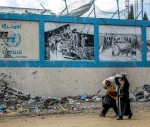You are here
Downgrading Africa’s development
Aug 10,2021 - Last updated at Aug 10,2021
CAIRO — In 2020, the COVID-19 pandemic triggered Africa’s first recession in a quarter-century and, with it, an avalanche of sovereign credit-rating downgrades across the region. Eighteen of the 32 African countries rated by at least one of the “big three” agencies — Fitch Ratings, Moody’s, and S&P Global Ratings, suffered downgrades that risk exacerbating the immediate crisis. Moreover, the ratings agencies’ actions could undermine the longer-term structural transformations needed to reduce these economies’ unhealthy commodity dependence.
Fifty-six per cent of rated African countries were downgraded last year, significantly above the global average of 31.8 per cent and the averages in other regions (45 per cent in the Americas, 28 per cent in Asia and 9 per cent in Europe). The share of affected African sovereigns is even higher (62.5 per cent) if we include the two (Kenya and Mauritius) downgraded in the first half of 2021. The glut of downgrades has been accompanied by a torrent of negative reviews of African countries’ ratings outlooks. Between them, the three agencies revised the outlook of 17 sovereigns, four from positive to stable and 13 from stable to negative.
The significance of these large-scale downgrades extends far beyond their number. Botswana, Mauritius, Morocco and South Africa had long enjoyed investment-grade status. But last year’s downgrades of Morocco and South Africa to “junk” status mean that Africa will emerge from the pandemic with more than 93 per cent of its sovereigns rated below investment grade, which could trigger disproportionately negative “cliff effects”.
The downgrades of African sovereigns are underpinned by several factors, but two are especially relevant to the region. The first is the ratings agencies’ institutional instinct to preserve their reputational capital. The second concerns so-called “perception premiums”, or the overinflated risks that the agencies perennially assign to African sovereign and corporate borrowers, irrespective of improving economic fundamentals.
By raising African countries’ risk premiums, the ratings cuts could hamper their access to the development finance that would support the growth and structural transformation of their economies. Higher premiums will increase borrowing costs and reduce demand for African public assets. Prevailing regulations either prohibit many foreign investors from holding sub-investment-grade securities, or generally deter such investments by requiring that extra capital be held against them.
The spillover effects of the downgrades were felt strongly across Africa when the sharp tightening of financial conditions early in the COVID-19 crisis led to sudden stops and reversals in capital flows. Capital outflows from the region reached new highs, with South Africa particularly affected. The country’s net non-resident portfolio outflows from bonds and equities exceeded $9.7 billion in 2020, or 3.26 per cent of GDP, and its ten-year bond yield rose by more than 100 basis points from 8.24 per cent to 9.27 per cent between January and September 2020.
Likewise, African sovereign Eurobond spreads increased dramatically in the wake of the downgrades. They sharply relative to the full JP Morgan EMBI averages, setting a record in June after rising by over 1,000 basis points above US Treasuries and more than 400 basis points above the all-grade EMBI composite index spread.
The fact that most African sovereign issuers were already rated below investment grade before the pandemic magnified the downgrades’ short-term effect on their international borrowing costs. Research by Moody’s has shown that whereas bond yields are relatively insensitive to downgrades when a borrower’s rating remains above investment grade, they become very responsive even to small downgrades when the rating is in junk territory. This may help to explain the large spreads across Africa last year, and it validates policymakers’ concerns about the cliff effects associated with the downgrades of Morocco and South Africa.
Besides their short-term economic effects, procyclical ratings downgrades can have long-lasting negative spillovers because they are not automatically reversed after a crisis has passed. As the pandemic gathered pace in April 2020, for example, Fitch announced a dramatic multi-notch downgrade of Gabon’s sovereign rating to CCC from B, largely on the grounds that falling oil prices would widen the country’s twin deficits and undermine the government’s capacity to honor its commitments to external creditors.
Although oil prices have since recovered to above pre-crisis levels, an upgrade of Gabon’s credit rating seems far from imminent. Empirical evidence shows that it takes an average of seven years for a downgraded developing country to regain its previous rating.
Early in the COVID-19 crisis, therefore, the European Securities and Markets Authority cautioned ratings agencies against deepening the downturn through quick-fire downgrades. The European Systemic Risk Board echoed these concerns, stressing the need for greater transparency and the timely incorporation in credit-rating models of changing economic fundamentals. With a view to reducing volatility, these regulators also advocated a through-the-cycle approach to credit-risk assessment.
Their concerns reflect the potential risks that procyclical downgrades pose to growth and financial stability. These dangers are even more acute in Africa, where private bondholders and commercial banks have become major providers of long-term development financing.
Affordable access to such financing will boost Africa’s returns on investment and accelerate the diversification of its sources of growth and trade. This, in turn, will increase African countries’ fiscal space and set them on a path toward long-term fiscal and debt sustainability, both of which are positive for credit ratings.
Ratings agencies should therefore pursue a more balanced approach that accounts for increases in credit risk, and thus preserves their reputational capital, without undermining developing countries’ economic recovery or long-term development goals. Striking that balance will enable African economies to escape the destructive twin traps of high-cost development financing and commodity dependency, and accelerate global income convergence.
Hippolyte Fofack is chief economist and director of Research and International Cooperation at the African Export-Import Bank (Afreximbank).













